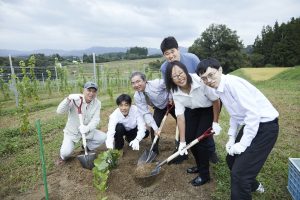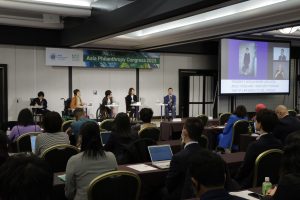In December Alliance digital editor, Charlotte Kilpatrick, had a chance to catch up with the chairman of The Nippon Foundation, Yohei Sasakawa. In the interview, Sasakawa shares highlights some of the foundation’s successes and sets out his ambitions for the future.
Charlotte Kilpatrick: So the first question actually is not on the list, but it’s fairly simple, could you tell me a bit about the establishment of The Nippon Foundation?
Yohei Sasakawa: After the war, and especially during that time in Japan there were no foundations or NGO. These are things that were in a way imported from the Western world. However, my father had a strong belief that things that needed doing the government alone were not able to do. He felt there is a strong need for the private sector to step in so that the things would become much more reinforced in order to become a much more matured democratic country.
CK: The Foundation has an interesting funding model. Could you tell me a bit how your funding model works?
YS: Racing of many kinds, from horses to bicycles to motorcycles, has always been very popular around the world and has the potential to generate large amounts of capital. Now, in the Second World War, Japan’s shipyards—which are a lifeline for a maritime nation—had all been systematically destroyed. So following the war, my father, on seeing a photo of motorboat races in an issue of Life magazine, was inspired to come up with a system that used races like these to not only help rebuild the shipping industry, but contribute to social welfare around the country as well.
This scheme was approved by the national Diet as well. It was put under the resolution and this resolution was passed. At the time, Japan was divided into two political sides: the left and the right. But for this resolution, the two sides cooperated and it passed with more than two-thirds of the vote, becoming the Motorboat Racing Law: the basis of our operations even today.
Under this law, local municipalities run motorboat races, and three percent of their gains are used by The Nippon Foundation to support the shipbuilding industry and social innovation projects throughout Japan and around the world. Motorboat races continue to be run by local municipalities even today.
‘One hope that I would like to achieve is that I would like to amend Japanese law to enable the establishment of non-profit corporations that would focus on social contribution. This is already present in UK, but not yet here in Japan’
But for the Foundation today, our revenues come not only from motorboat races, but from private donations as well. We use both in order to support our many projects.
CK: What is the significance for you of having a conference on philanthropy with an Asian focus?
YS: Well Asia, as you know, is a growing economic region, and is ethnically quite diverse. At the same time many of the countries are still very young in terms of democratic history, and therefore I think that there are a lot of things that these countries would be able to learn from the experience that Japan has, because while foundations and NGOs and NPOs, do exist in those countries, they’re still limited in the fields in which they are active.
Therefore the idea is to share our knowledge and our history with them, and at the same time we would like to work together with them so that we can create the diverse network within the region in Asia.
CK: Last year as well, we talked with you, and you said that The Nippon Foundation can plan decades in advance because it retains its leadership. How does The Nippon Foundation adapt to immediate, unplanned crises?
YS: When it comes to the long-term these days people will talk about sustainability, that seems to have become the buzzword in the international society, but we have been doing this sustainable activity for 40 or 50 years. Leprosy is one of the areas where we have been working for more than 50 years now. We also have our capacity building program which is one of the longest programs that we have been doing thus far.
To date, we have provided scholarships for more than 40,000 people around the world, working in cooperation with countless universities and educational institutions around the world, providing Masters and doctorate degrees, scholarship programs. Some of those capacity building programs are also aimed towards the deaf as well as the visually impaired. And therefore this is in a way one of the programs that we stand in quite a long-term view in order to nurture those people. And the same time, we also have set aside a separate budget for dealing with more immediate things, like emergencies.
The Nippon Foundation excels in providing swift assistance where the government and public administration are unable to intervene as promptly as we do. While we have a long-term plan, we also have a system in place that allows us to make quick decisions and provide aid in various ways, leveraging our financial resources and networks. We are committed to supporting people affected by natural disasters, the COVID-19 pandemic, and refugees from Ukraine.
CK: The Nippon Foundation was instrumental in creating the concept of impact investment. How do you see impact investment evolving into the future?
YS: I left the field of economics 47 years ago, so it’s hard for me to tell how this is going to be directed down the road in the future. However, we have a department that specifically focuses on impact investment.
One hope that I would like to achieve is that I would like to amend Japanese law to enable the establishment of non-profit corporation that would focus on social contribution. This is already present in UK, but not yet here in Japan. At the same time, I’m sure that impact investment is going to become one thing that investors will use to decide on which company to invest in in the future, because I think that ESG for example, has become one of such indicator for investors to choose which company to invest in. Therefore I’m sure that impact investment is going to become something similar to that.
CK: Looking back over your time with The Nippon Foundation, what are you the most proud of?
YS: Well, I would say that the most important things we have done, in any of our projects, is to be open about our results. In addition, all of our projects to date have been based upon a strong future-oriented approach. We are quite satisfied with what we have done that way.

The chairman working with the staff members of Art Paysan Winery to plant seedlings of Chardonnay a white grape variety. Photo credit: Akari Hasegawa
Also, humanitarian support is one of the important areas that we focus on internationally. Take for example, leprosy. I have visited about a hundred countries multiple times and worked to eliminate leprosy from those countries.
And Japan is an aging society, meaning that it has a low birth rate. We feel that the children are important for the future of Japan, therefore we have helped the government to establish the Ministry for Children. At the same time we have also provided the propositions in order to amend the basic law of the sea at the international level, and so in a way activities that we take are now being recognised from the governmental level as well.
Our propositions are becoming more and more valued from the government perspective, which I am quite happy about. And one of the initiatives that we have done recently, which is the big one, has to do with the microfilming of the hard copies of the National Diet Library. There are a lot of publishing documentations in National Diet Library that needs to be microfilmed in order to keep it for a long period of time. For this, we have wanted to enable people with disabilities to do this work.
At the very beginning when we initially brought this idea up, many of the experts actually laughed, saying it was impossible. However, we have trained all these people with disabilities and finally they have had their capabilities recognised and are now able to be contracted for this work.
‘Japan is an aging society, meaning that it has a low birth rate. We feel that the children are important for the future of Japan, therefore we have helped the government to establish the Ministry for Children.’
These people with disabilities are able to earn more money than before. In the past, they were only earning $100 or $150 per month, but now with this they can earn more than $1000 per month. In the past they were taken care of through government subsidy, but with this kind of initiative they have proven themselves, have gained confidence and have shown that they are competent enough to hold such jobs and become taxpayers.
CK: What do you hope the attendees at the conference will take away with them?
YS: Well, I would say that the takeaway would be that they are all able to build a network of their peers. There are individuals who are doing good for society, and those are, right now, individually-based kind of approach, and it’s not really an organised manner. I think that they do not know the common theme that ties them all together. The Nippon Foundation would like to become the platform so that these people would be able to be linked to one another.
Charlotte Kilpatrick is the digital editor at Alliance








Comments (0)